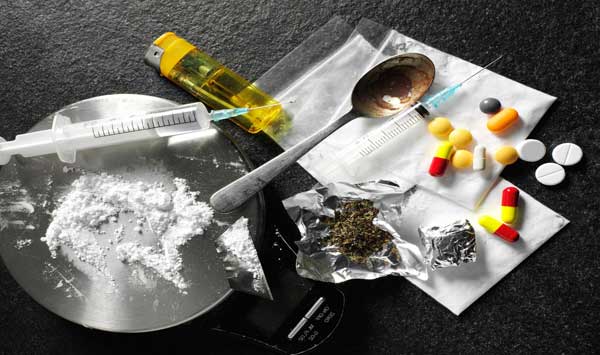

As the senior partner in the largest criminal practice in Scotland for over 20 years, Richard Freeman has been heavily involved in both defending and managing one of the biggest case loads of drug offences in Scotland year on year. He has represented tens of thousands of clients charged with the whole gamut of drug offences, frequently representing clients in the High Court at the uppermost end of the scale.
The Scottish Courts, process many drug related offences on a daily basis, from the most minor offences such as possession of what was regarded as a "Legal High" recently made illegal, to serious organised crime involving the production, importation or large scale supply of class A drugs, prosecuted in the High Court.
The most frequently prosecuted offences are:
Richard Freeman (AKA Mr. Technicality) is one of Scotland's most prominent Solicitor Advocates with the skills, decades of experience and technical expertise to vigorously defend your position. Its important to enlist the services of an expert defence lawyer with a strong track record such as Mr. Freeman.
 Do not delay, time is vital in order for us to properly examine the evidence against you, contact potential witnesses, ensure timelines are consistent with the evidence and investigate many other aspects in order to create your strongest legal defence.
Do not delay, time is vital in order for us to properly examine the evidence against you, contact potential witnesses, ensure timelines are consistent with the evidence and investigate many other aspects in order to create your strongest legal defence.
Call our national helpline 0800 567 7810 now or our local numbers. Alternatively, complete a contact form or request a call back.
 OR
OR

There is often an overlap in the commission of these categories of drug offences, and prosecutors will often try to prosecute the one drug activity as a number of different offences against an accused. The High Court is clear that they have to choose one offence only for a conviction.
Very often the Prosecution will over-prosecute an accused with a more serious drug offence that they can prove. This happens most frequently when someone is prosecuted for possession with intent to supply based in the volume and purity of the drug, where in fact the amount of drug is only sufficient for personal use ie possession only.
Where the Prosecution is unsure of what involvement a suspect has in the chain of supply, that person will often be charges with being concerned in the supply of drugs. A typical example of this is someone who is being paid a relatively small amount of money to safe-house a large quantity of drugs. This could be for a short period of time but the police are tipped off and obtain a search warrant to search and seize the drugs and arrest the householder. Another example is someone who is simply transporting the drugs from one place to another. These are still regarded as very serious offences and such individuals can often find themselves in the High Court facing lengthy sentences of imprisonment. It is vitally important that a solicitor is instructed at an early stage to determine the best solution.
Often there are procedural and evidential issues with the prosecution of drug cases, in particular the granting and execution of a search warrant, or the admissibility of evidence stemming from covert surveillance activities by the Police. Expert knowledge of these technical issues can make the difference to securing an acquittal of the charges in the face of adversity.
The evidence in a drugs case tends to be a common feature to a greater or lesser extent, from case to case, the extent to which can determine how the case is prosecuted, which court it will fall into, and the severity of any potential sentence.
Typical misuse of drugs evidence is known as paraphernalia, such as tick lists, bulking agents, tools, presses, scales, bags, lighting, electricity bills, and tenancy agreements.
As part of a more extensive investigation the Police will obtain financial statements, unexplained wealth, vehicles, and will interview neighbours to explain any unusual activity. All this evidence has to be scrutinised by the defence, as they may not have the evidential inferences that the prosecution would hope to advance.
Drugs are controlled by the Misuse of Drugs Act 1971 and are separated into different classes depending on the harm each drug is capable of causing to those using them. The most dangerous drugs carry the most severe punishment.
The classes are divided into Class A,B and C in descending order of harm, and therefore severity of sentences imposed:
CLASS A - Common examples are Heroin, Cocaine, LSD, Ecstasy methamphetamine (Crystal meth), Psilocybe (magic) mushrooms.
CLASS B - Common examples are Amphetamines, (known as speed), Cannabis and other Cannabinoids. Also commonly prosecuted legally prescribed drugs fall into this category, if held in excess volumes such as Codeine and Dihydrocodeine.
CLASS C - Common examples include benzodiazepines, such as Alprazolam, Bromazepam, Diazepam and Nitrazepam. Also anabolic steroids, and Stimulants like Benphetamine which can metabolise into amphetamine.
New drugs are being produced an a regular basis and are being investigated by the Advisory Council on the Misuse of Drugs. The Council report to the Secretary of State who can control and classify the drug by statutory instrument.
Many of our clients at Criminal Defence Solutions are getting caught out believing the drug they have is a legal high but which quickly finds itself to be a controlled drug because of their psychoactive nature.
Criminal Defence Solutions are well versed in all the important nuances set out in the Misuse of Drugs Act 1971, and the proliferation of Case Law on drugs offences, regularly reported from the Appeal Court. This case law is vitally important, as it is interprets the convoluted provisions of what has been regarded by many, as a clumsy Act of Parliament.
To provide the best possible advice, and to formulate the best solution to clients who are facing drug charges, it is vitally important that a solicitor has intimate and up to the minute knowledge of drug law.
Additionally the courts have determined the circumstances which can amount to good mitigation, and equally those that can be regarded as aggravating circumstances. Both can significantly affect the ultimate sentence, if convicted. At Criminal Defence Solutions we ensure that all mitigating circumstances can be compellingly and compassionately presented to the court to secure the best possible outcome for the client.
CONTACT US NOW
An early judgement call from highly experienced and skilled solicitors and solicitor advocates, may be essential to protect the interests of anyone finding themselves suspected of an involvement in the drug trafficking industry.
THIS COULD MAKE THE DIFFERENCE BETWEEN A CONVICTION OR NOT, OR A JAIL SENTENCE OR NOT. CONTACT CRIMINAL DEFENCE SOLUTIONS FOR A FREE CONSULTATION WITH ONE OF OUR LAWYERS.
WE WILL KEEP YOU RIGHT!